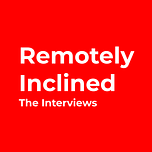Laurel Farrer has been leading remote organizations for 14 years, well before it was a hot topic. Now, she helps other companies figure out their remote work arrangements with her company Distribute Consulting and she built a thriving community of remote workers in the Remote Work Association.
While Laurel knows there’s a lot of flexibility in remote work, one thing that grinds her gears is when people have complained about wanting remote work for years only to deride organizations now for “downloading” office expenses onto employees. To quote: “Will no one ever be satisfied?”
In this interview, Laurel shared the four categories of remote work infrastructure, how to take care of your mental health during both the pandemic and with regular remote work, and more.
Remote infrastructure is four things
→ Too many companies ignore infrastructure, believing that once you don’t need an office space anymore, you’re good. Not only is this not the case for hybrid remote companies, but it’s also not true of all-remote companies.
Physical infrastructure: All workers, remote or not, need a place to work - desks, chairs, wifi, etc. For a business, this could mean an office, coworking memberships, or home office stipends.
Digital tools: Whatever tools you need to get your work done. This was commonplace in an office environment, but additional tools for communication and collaboration are critical.
Processes and rituals: You may not see everyone every day, so no chatting by the coffee machine. But that doesn’t mean you can’t build regular practices to make work life easier and more pleasant.
Information management: If you don’t manage information properly, you get the worst of both worlds.
Mental health: Remote work challenge accelerated by the pandemic
→ Like an office environment, a remote work environment has mental health risks associated with it. That’s to be expected.
→ The difference between offices and remote work is that feelings of isolation, disconnection, and micromanagement can be very physical, whereas they might be more difficult to pin down in an office full of people.
→ Unfortunately, the pandemic served to accelerate and exacerbate all these issues, meaning it’s critical that people check in with themselves.
→ Self check in questions should be about discovering patterns which you can then do something about. This is entirely about what works for you - not about any sort of best practice.
The final word
“There is no right way to do remote work. It’s however you want to leverage this as a strategy in order to optimize operations or retain employees or access a greater talent pool. It’s up to you.”
Remotely Inclined Chats with Laurel Farrer
Transcript edited for brevity and clarity.
Stefan: Welcome, Laurel! What’s your remote work journey and why did you found Distribute Consulting?
Laurel: I’ve been working remotely for 14 years. The entire time I was operating distributed companies. And 14 years ago, remote work wasn’t cool. It wasn’t natural. I got a lot of questions. Through those years, I was a consultant informally on the side, answering those questions. About four years ago I was experiencing a horrible company culture, and I said I was going to dedicate my life to preventing this for other people. I unexpectedly quit my job because it got to a level where I couldn’t do it anymore. I thought about what would be next, and I knew I wanted to strengthen the conversation about virtual organizational development and create the resources I wanted and needed as a distributed company executive.
What does it mean to be an “office manager” in a virtual world?
The role of an office manager is to keep operations humming - to create an environment in which productivity and business operations continue and people have a place to come together that fuels their productivity and collaboration. That’s exactly what you do as an office manager in a remote company, but in a virtual space.
We still need to have a place to work together. We still have tools to manage. We still have environments to create activities or to plan and coordinate.
How does the office manager role change in a hybrid-first remote world?
The goal with remote work is not to necessarily make everybody go distributed overnight. We can’t do that. It would completely crush our economy. What we need to think of instead is location irrelevancy in our work so business operations can continue regardless of where we are. So that means we can be just as productive outside of the office as we can be inside of the office. That’s where this new office management role becomes environment creation - we’re going to create an environment where people can collaborate digitally in order to work together as a team in order to produce and review output. It’s creating infrastructure of employee engagement, culture, rituals, and accessibility. It’s just making the office digital instead of physical.
Continuing on the idea of infrastructure - what physical infrastructure is necessary in a remote work world?
This is a conversation too many people neglect. We’re still physical people - we might work in digital spaces, but we’re physical. We need to pay attention to our coworking spaces or home offices or mobile and HQ offices. They have to support our health and safety so we can continue to be productive, safe, and strong mentally, emotionally, and physically.
The conversation about infrastructure is not just tools. Too many people stop there once they figure out if they should have Microsoft Teams or Slack. It’s bigger than that. It’s about how you’re interacting with each other.
Infrastructure is four things:
Physical infrastructure like offices and desks.
Digital tools like Zoom or Slack.
Processes and rituals to help people get their work done.
Information management to ensure everything is accessible for people to do their jobs.
I spoke with Avery Francis on the podcast about mental health for remote workers. How many current mental health issues are embedded in remote work versus caused by COVID?
There are health risks - mental health, emotional health - that come along with working remotely. The coronavirus pandemic exacerbates them. We’re at risk of feelings of invisibility or micromanagement or imposter syndrome. Or feeling very controlled by our leadership team. Or burnout. Or informational isolation. Or feeling disconnected from our job.
When we’re in this exaggerated situation, all those problems become even more extreme. So people have to be hyper-aware and hyper-preventative of that isolation, burnout, and micromanagement, which means they need to be extremely proactive in self-awareness and thinking about “ok, do I have a problem? How am I doing today?”
Some ideas:
Cutting off work at scheduled times.
Start work at scheduled times.
Reach out to a coworker.
Go for a run during lunch.
The point of remote work is that it’s all about employee empowerment. It’s autonomy management, which means we’re in control. We don’t have to be supervised, which is a double-edged sword. On one side you get all this freedom, but on the other it’s up to you - if you’re feeling these problems of burnout or isolation, you’ve got to be willing to solve it.
What steps can people take if they do a self-check in and things aren’t going well?
You’re learning about yourself. So for some people, that’s journaling. For some people it’s talking it out with a friend. Or talking to a therapist. Or taking a schedule of their day and collecting data about how you feel at different points of the day.
However you get there, just get a point of clarity and be able to notice patterns.
Is remote work just an excuse for companies to make employees pay for things like rent and desks?
I always laugh at this conversation. For the past 10 years, employees have been begging their employees to please see the light about how much money you can save. And that productivity is going to increase and output will increase and retention is going to increase. And the employers wouldn’t even think of it. And now all of a sudden we have this global boom and everyone’s saying employers are just trying to take advantage. Will no one ever be satisfied?
There are pros and cons to both. Companies will save tons of expenses, but now some other expenses they’d never even thought about in their budget, like increased travel or home office stipends or coworking memberships… now they have to compensate for those.
There is no right way to do remote work. It’s however you want to leverage this as a strategy in order to optimize operations or retain employees or access a greater talent pool. It’s up to you.
Amazing, thank you for your insights!
You can get in touch with Laurel Farrer on LinkedIn. You can also check out Distribute Consulting and the Remote Work Association.














Share this post